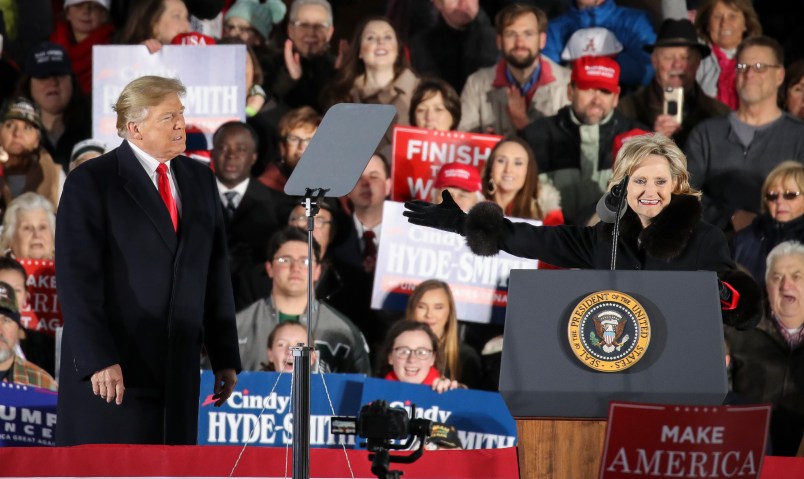Sen. Cindy Hyde-Smith (R-MS) hung on for a win in her special runoff election Tuesday, giving her two more years in the Senate in spite of a gaffe-filled campaign that made her race closer than it should have been.
Hyde-Smith led former U.S. Agriculture Secretary Mike Espy (D) by 56 percent to 44 percent with 76 percent of precincts reporting. The Associated Press has called the race.
Hyde-Smith’s win is historic — she’s the first woman to be elected to the Senate from Mississippi. Espy would have been the first African-American elected from the state since Reconstruction.
But it was her odd gaffes that prompted intense discussion in the state and nationally about Mississippi’s dark racial history.
Hyde-Smith appeared likely to coast to election after Nov. 8, when she took 42 percent of the vote to Espy’s 41 percent and Tea Party-aligned Chris McDaniel’s (R) 17 percent in the all-party primary.
That was until video surfaced of her saying at a campaign event that if a supporter “invited me to a public hanging, I would be on the front row.”
Those remarks set off a national maelstrom, with Democrats seeing them as a reference to lynching in a state that had the highest number of lynchings in the Jim Crow era. Even Republicans say she badly mishandled the fallout, refusing to apologize for more than a week before issuing a quasi-apology to “anyone that was offended” during her debate with Espy.
She also joked about making it “a little more difficult” for liberals to vote. Reporters uncovered a pattern of her touting the Confederacy in the past, from bills she introduced in the statehouse to honor the last daughter of a Confederate soldier and rename a state highway after Confederate President Jefferson Davis to her visit to Davis’s home, where she posted a photo with the caption “Mississippi history at its best. And it was revealed that she’d attended a private high school that was created to avoid desegregation — and sent her daughter to one as well.
But all that was not enough to fell her in a state with the most racially polarized voting in the country. The state is more than one-third African-American, the highest in the nation, but its conservative white voters go overwhelmingly for the GOP.
Trump remains exceedingly popular there with most of the state’s white voters, and attended a pair of rallies on her behalf on election eve to make sure GOP turnout didn’t drop off enough to put her in real jeopardy. And GOP outside groups outspent Democrats by a wide margin on the race, seeking to avoid a repeat of Sen. Doug Jones’ (D-AL) 2017 upset victory over scandal-plagued former judge Roy Moore (R).
And Espy, while a serious candidate, had baggage of his own. Hyde-Smith and her allies pounded on him for lobbying for the former president of the Ivory Coast, who faces charges of crimes against humanity.
The result gives Senate Republicans a 53-47 majority for the next term of Congress — and more breathing room to confirm President Trump’s appointees to the federal bench, a top priority of Senate Majority Leader Mitch McConnell (R-KY). Democrats lost a net of two Senate seats in the 2018 elections, winning seats in Nevada and Arizona but losing Missouri, North Dakota, Indiana and Florida.







And now the great news
Mississippi. Goddamn.
Not a surprise, the radical racist got a lot of the vote in the first round, and that basically transferred over to Hyde-Smith. I tend to believe that her “controversies” were nothing but dog whistles to those racists to make sure they came out and voted for her instead of staying home.
At some point, the racists are going to die off, and young people, even in MS, are much more liberal and open to others. If the Democrats were smart, they would start up the 50 state program again and build up their party infrastructure in every state…even the lost causes like MS can turn into a place where Democrats can win at least some of the time. Right now, even a good candidate like Espy is basically on his own in states like this, and that has to change.
Racist wins. Oh Mississippi!
Mississippi to America:
“Welcome to Klan Kountry”.